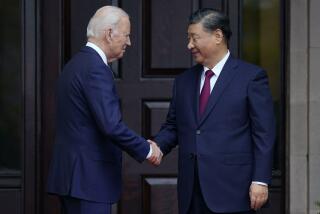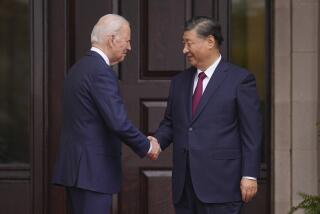Clinton May Host Chinese President : Diplomacy: A White House summit would ease Sino-U.S. strains. But detention of activist Harry Wu could interfere.
- Share via
BANDAR SERI BEGAWAN, Brunei — President Clinton may soon invite Chinese President Jiang Zemin to Washington for what would be the first White House visit by any top Chinese leader since the Tian An Men Square crackdown of 1989, Secretary of State Warren Christopher said Monday.
No formal invitation has been extended. And Christopher said it would be “very difficult” to have such a summit while China still holds Harry Wu, the Chinese American human rights activist jailed while trying to sneak into China in June.
Nevertheless, Christopher’s comments--made as he traveled from Honolulu to a conference of Asian leaders here--marked the first, formal acknowledgment that the Administration is working toward a White House summit with China. The prospect of such a session is already attracting opposition from human rights groups.
“If Jiang were invited to the White House, that would be a big step up” between the United States and China, said Mike Jendrzejczyk, Washington director of Human Rights Watch / Asia. “I think it would be a mistake to reward the Chinese with such a high-level visit, unless there are some substantial concessions on human rights.”
State Department officials said Christopher plans to discuss a Washington summit when he meets Chinese Foreign Minister Qian Qichen here today. The Clinton Administration is now striving to improve strained relations and to placate China’s fury over Clinton’s recent decision to let Taiwan President Lee Teng-hui visit the United States.
Until 1989, top-level visits between U.S. Presidents and top Chinese leaders were a staple of relations between the two countries. But since China’s 1989 upheavals, summits have been rare, brief and away from Washington. American leaders have feared that holding out the White House welcome mat would arouse too much opposition in Congress and in U.S. public opinion.
President George Bush invited Qian, who ranks below China’s top leaders, to the White House in 1990. Bush met once with Chinese Premier Li Peng at the United Nations. Clinton has had two sessions with Jiang, the Chinese president, at a meeting of Asian leaders in Seattle in 1993 and in Jakarta, Indonesia, in November.
For two years, Jiang has tried without success to have other meetings with Clinton. Chinese officials have repeatedly made it plain he would like a summit in Washington or to have Clinton visit China.
With or without an invitation from Clinton, the Chinese president is likely to visit New York in October to attend the 50th anniversary of the formation of the U.N. Security Council.
In recent weeks, Administration officials have begun privately talking about a summit while Jiang is in the United States. But until Christopher’s remarks Monday, no Administration official had revealed that the Administration had in mind a full White House visit for Jiang.
One of the problems still to be worked out is China’s continuing detention of Wu, who has uncovered abuses in the Chinese prison system and its exports of products made with prison labor. The U.S. citizen, arrested June 19 as he tried to sneak into China from Kazakhstan, has been charged with espionage.
Administration officials have said they hope Wu will be released and permitted to leave China in the next few weeks. Some have speculated that he may be set free before an international women’s conference convenes in Beijing at the end of August because his confinement might touch off protests that would distract from the U.N.-sponsored conference.
The Administration’s sensitivity about the political effect of a summit was apparent Monday as Christopher tried to find words to avoid offending China--or irritating Beijing’s critics in Congress.
In a news conference aboard his plane, Christopher at first appeared to suggest that a Clinton-Jiang summit might take place this fall even if Wu is still jailed. He said that the Wu case will be “one of the factors” the Administration will take into account when it decides about a summit.
That vague language seemed designed to avoid presenting China with an ultimatum or conditions requiring Wu’s release. But then Christopher and his aides decided it would be politically damaging in Washington if they appeared to suggest a summit might be held even while Wu is detained.
After two hours, Christopher returned with new, stronger language emphasizing that it would be “very difficult for me to envision” a summit until after Wu’s release.
More to Read
Sign up for Essential California
The most important California stories and recommendations in your inbox every morning.
You may occasionally receive promotional content from the Los Angeles Times.










